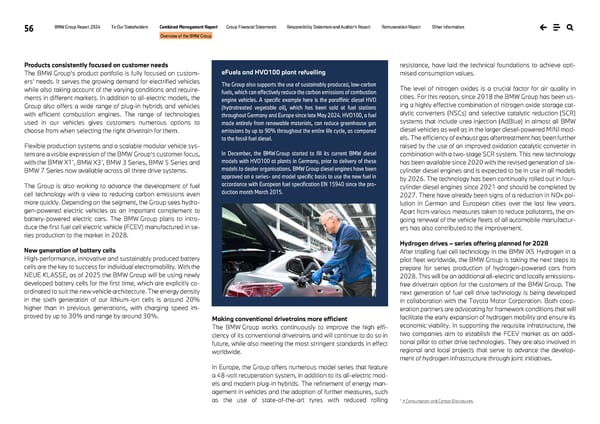56 BMW Group Report 2024 To Our Stakeholders Combined Management Report Group Financial Statements Responsibility Statement and Auditor’s Report Remuneration Report Other Information Overview of the BMW Group Products consistently focused on customer needs The BMW Group’s product portfolio is fully focused on custom- ers’ needs. It serves the growing demand for electrified vehicles while also taking account of the varying conditions and require- ments in different markets. In addition to all-electric models, the Group also offers a wide range of plug-in hybrids and vehicles with efficient combustion engines. The range of technologies used in our vehicles gives customers numerous options to choose from when selecting the right drivetrain for them. Flexible production systems and a scalable modular vehicle sys- tem are a visible expression of the BMW Group’s customer focus, with the BMW X1*, BMW X3*, BMW 3 Series, BMW 5 Series and BMW 7 Series now available across all three drive systems. The Group is also working to advance the development of fuel cell technology with a view to reducing carbon emissions even more quickly. Depending on the segment, the Group sees hydro- gen-powered electric vehicles as an important complement to battery-powered electric cars. The BMW Group plans to intro- duce the first fuel cell electric vehicle (FCEV) manufactured in se- ries production to the market in 2028. New generation of battery cells High-performance, innovative and sustainably produced battery cells are the key to success for individual electromobility. With the NEUE KLASSE, as of 2025 the BMW Group will be using newly developed battery cells for the first time, which are explicitly co- ordinated to suit the new vehicle architecture. The energy density in the sixth generation of our lithium-ion cells is around 20% higher than in previous generations, with charging speed im- proved by up to 30% and range by around 30%. Making conventional drivetrains more efficient The BMW Group works continuously to improve the high effi- ciency of its conventional drivetrains and will continue to do so in future, while also meeting the most stringent standards in effect worldwide. In Europe, the Group offers numerous model series that feature a 48-volt recuperation system, in addition to its all-electric mod- els and modern plug-in hybrids. The refinement of energy man- agement in vehicles and the adoption of further measures, such as the use of state-of-the-art tyres with reduced rolling resistance, have laid the technical foundations to achieve opti- mised consumption values. The level of nitrogen oxides is a crucial factor for air quality in cities. For this reason, since 2018 the BMW Group has been us- ing a highly effective combination of nitrogen oxide storage cat- alytic converters (NSCs) and selective catalytic reduction (SCR) systems that include urea injection (AdBlue) in almost all BMW diesel vehicles as well as in the larger diesel-powered MINI mod- els. The efficiency of exhaust gas aftertreatment has been further raised by the use of an improved oxidation catalytic converter in combination with a two-stage SCR system. This new technology has been available since 2020 with the revised generation of six- cylinder diesel engines and is expected to be in use in all models by 2026. The technology has been continually rolled out in four- cylinder diesel engines since 2021 and should be completed by 2027. There have already been signs of a reduction in NOx pol- lution in German and European cities over the last few years. Apart from various measures taken to reduce pollutants, the on- going renewal of the vehicle fleets of all automobile manufactur- ers has also contributed to the improvement. Hydrogen drives – series offering planned for 2028 After trialling fuel cell technology in the BMW iX5 Hydrogen in a pilot fleet worldwide, the BMW Group is taking the next steps to prepare for series production of hydrogen-powered cars from 2028. This will be an additional all-electric and locally emissions- free drivetrain option for the customers of the BMW Group. The next generation of fuel cell drive technology is being developed in collaboration with the Toyota Motor Corporation. Both coop- eration partners are advocating for framework conditions that will facilitate the early expansion of hydrogen mobility and ensure its economic viability. In supporting the requisite infrastructure, the two companies aim to establish the FCEV market as an addi- tional pillar to other drive technologies. They are also involved in regional and local projects that serve to advance the develop- ment of hydrogen infrastructure through joint initiatives. * ↗ Consumption and Carbon Disclosures. eFuels and HVO100 plant refuelling The Group also supports the use of sustainably produced, low-carbon fuels, which can effectively reduce the carbon emissions of combustion engine vehicles. A specific example here is the paraffinic diesel HVO (hydrotreated vegetable oil), which has been sold at fuel stations throughout Germany and Europe since late May 2024. HVO100, a fuel made entirely from renewable materials, can reduce greenhouse gas emissions by up to 90% throughout the entire life cycle, as compared to the fossil fuel diesel. In December, the BMW Group started to fill its current BMW diesel models with HVO100 at plants in Germany, prior to delivery of these models to dealer organisations. BMW Group diesel engines have been approved on a series- and model specific basis to use the new fuel in accordance with European fuel specification EN 15940 since the pro- duction month March 2015.
 BMW Group Report 2024 Page 55 Page 57
BMW Group Report 2024 Page 55 Page 57